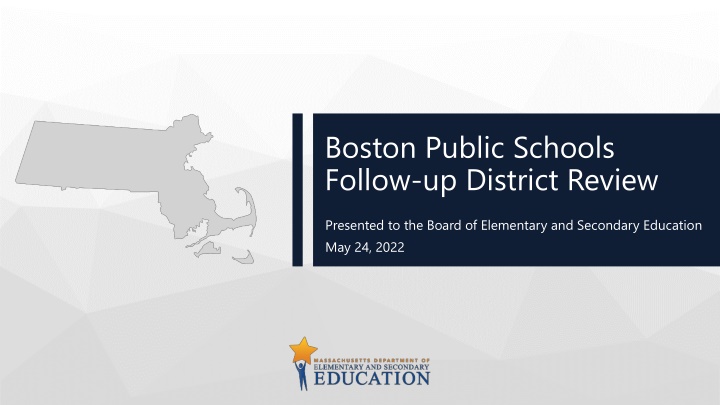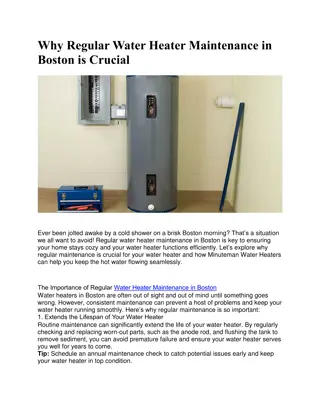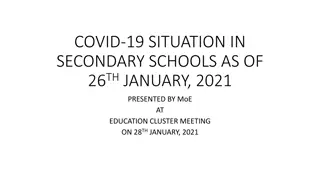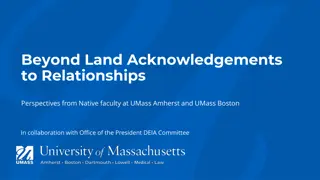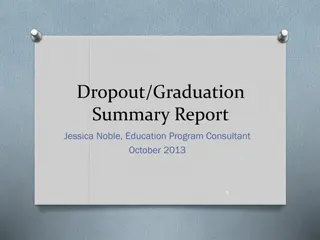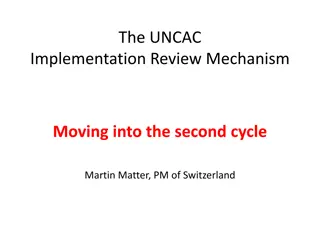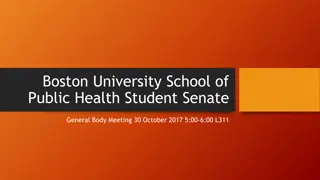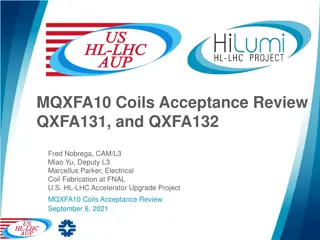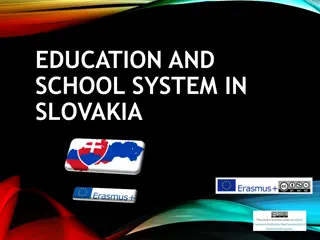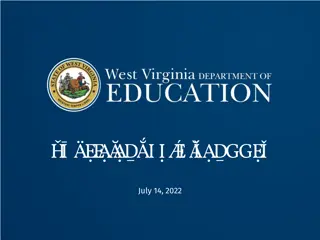Boston Public Schools Follow-up Review Summary
This document highlights the follow-up district review of Boston Public Schools by the Massachusetts Department of Elementary and Secondary Education. It covers the historical background, DESE review team, review process details, and key findings. The comprehensive report includes insights from interviews, focus groups, classroom observations, and recommendations for improvement.
Download Presentation

Please find below an Image/Link to download the presentation.
The content on the website is provided AS IS for your information and personal use only. It may not be sold, licensed, or shared on other websites without obtaining consent from the author.If you encounter any issues during the download, it is possible that the publisher has removed the file from their server.
You are allowed to download the files provided on this website for personal or commercial use, subject to the condition that they are used lawfully. All files are the property of their respective owners.
The content on the website is provided AS IS for your information and personal use only. It may not be sold, licensed, or shared on other websites without obtaining consent from the author.
E N D
Presentation Transcript
Boston Public Schools Follow-up District Review Presented to the Board of Elementary and Secondary Education May 24, 2022
Historical Background Fall 2019 DESE completed a district review of the Boston Public Schools (BPS) March 2020 DESE district review report released and Memorandum of Understanding (MOU) signed between BPS and DESE March 2020 to May 2021 three amendments to extend time allowed for target-setting process May 2021 fourth amendment establishing targets associated with MOU 2022 school year monthly monitoring meetings between DESE and BPS 2 Massachusetts Department of Elementary and Secondary Education
DESE review team Standard Leads Russell Johnston Komal Bhasin Lauren Woo Rob Curtin project lead Anne Marie Stronach Standard(s) Leadership and Governance, Student Support Curriculum and Instruction, Student Support Human Resources and Professional Development Assessment Financial and Asset Management 27 additional DESE staff served as part of review team or other assistance role (full listing of staff in Appendix A of the report) Classroom observations conducted by the American Institutes for Research (AIR) 3 Massachusetts Department of Elementary and Secondary Education
Review Process The site visit to BPS was conducted from March 28 to March 30, 2022. The site visit included: o 97 interviews with 100 stakeholders school committee members, district administrators, teachers association representatives, and city officials o 25 focus groups students, parents/guardians, advocacy organizations, and staff, including principals, teachers, special education coordinators, and language acquisition team facilitators Classroom observations conducted by AIR from March 28 to April 1, 2022 o 477 classrooms in a representative sample of 42 schools (full listing of schools found in Appendix A) 4 Massachusetts Department of Elementary and Secondary Education
Review Process Draft report shared with BPS for factual correction on May 12, 2022 and returned to DESE on May 19, 2022 Full follow-up district review report released publicly on May 23, 2022 o Introduction and Executive Summary o Contextual background, strengths, challenges and areas for growth, and recommendations for each standard o Appendices (DESE staff listing, data tables, interview/focus group listing, and detailed classroom observation report) Report is as of April 1, 2022 and events or initiatives following that date were not considered in the findings 5 Massachusetts Department of Elementary and Secondary Education
District review standards Six district review standards and associated indicators oLeadership and Governance oCurriculum and Instruction oStudent Support oHuman Resources and Professional Development oAssessment oFinancial and Asset Management Massachusetts Department of Elementary and Secondary Education
Leadership and Governance 01 Leadership and Governance
Leadership and Governance Strength Finding The District Strategic Plan is beginning to guide the work of the district. Multiple initiatives are underway including the advancement of instructional priorities, development and use of the district s Racial Equity Planning Tool, and enhanced accessibility for families and community members. School committee and city leaders have created supporting documents and made commitments aligned to the strategic plan. 8 Massachusetts Department of Elementary and Secondary Education
Leadership and Governance Challenges and Areas for Growth District leaders have not prioritized two BPS functions in crisis. Special education and transportation were identified as critical BPS priorities in the BPS-DESE MOU, yet these functions have stagnated and, in some cases, further deteriorated since 2020. The deficiencies in these areas disproportionately affect many of BPS s most vulnerable students and the district lacks the requisite staff capacity for improvements. The district continues to lack the central office capacity and systems necessary to drive improvement in the 31 lowest performing BPS schools, despite this being a BPS priority identified in the MOU. While these schools have received additional staff and were prioritized for district-wide instructional initiatives, they still lack high-quality targeted improvement plans, sufficient central office support, and accountability for results. 9 Massachusetts Department of Elementary and Secondary Education
Leadership and Governance Challenges and Areas for Growth Leadership instability at the school committee, superintendent, and department level is endemic at BPS and continues to impede district improvement efforts and hamper support for school-level leaders and staff. Rapid leadership turnover in departments serving English learners and students with disabilities, as well as operational departments, is especially concerning. The district has not yet implemented a robust, district-wide system for tracking implementation progress or measuring outcomes across the six commitments and 40+ priorities outlined in the district s strategic plan. Some initiatives in the strategic plan are off-track or not yet fully launched and lack project plans and clear timelines for when progress can be expected. 10 Massachusetts Department of Elementary and Secondary Education
Curriculum and Instruction 02 Curriculum and Instruction
Curriculum and Instruction Strength Findings The district has made significant investments in initiatives intended to strengthen core instruction an instructional focus area of equitable literacy and high- quality curriculum adoption and this work is showing some evidence of impact at the school level, particularly in grades K-8. These items were cited as recommendations for BPS in the 2020 District Review Report. The district has adopted MassCore, the state s recommended program of study intended to align high school coursework with college and workforce expectations, beginning with incoming ninth graders in fall 2022. Adopting MassCore was identified in the BPS-DESE MOU as a priority for BPS. In addition, the district has advanced other initiatives intended to promote equitable access to coursework across the district. 12 Massachusetts Department of Elementary and Secondary Education
Curriculum and Instruction Challenges and Areas for Growth Despite initial progress in establishing an instructional focus for the district, there is variation in school-level implementation of its instructional priorities and the district has not yet fully established systems to monitor quality implementation. Despite progress made in planning for the rollout of a district-wide instructional focus, the instructional quality and equitable access to advanced coursework at the high school level remains a challenge. Expectations for instruction, including use of high-quality curricular materials and alignment with the district s instructional focus, are insufficiently defined for the district s high schools. While MassCore adoption will support improved student outcomes over time, access to consistent graduation standards and advanced coursework remains highly inequitable across student groups. 13 Massachusetts Department of Elementary and Secondary Education
Curriculum and Instruction Challenges and Areas for Growth The quality of organizational and instructional practices observed in observed classrooms were primarily rated in the middle range, indicating that classroom practices associated with improved outcomes were evident but not exhibited consistently or in a way that included all students. In general, classroom organizational practices and student engagement practices received higher ratings than those practices related to instructional support. 14 Massachusetts Department of Elementary and Secondary Education
Student Support 03 Student Support
Student Support Strength Findings The Office of English Learners has laid the groundwork for enhanced English learner supports and outcomes through effective stakeholder engagement, enhanced school-level communication, and investments in professional development, personnel, and infrastructure. 16 Massachusetts Department of Elementary and Secondary Education
Student Support Challenges and Areas for Growth The district has demonstrated a lack of urgency in improving special education services, failing to make discernable progress in this area despite repeated DESE findings and a commitment by BPS in the MOU to address special education. The district s special education services remain in systemic disarray, lack consistent policies and procedures, and do not consistently provide appropriate learning opportunities in the least restrictive environment for all students with disabilities. The district is not ensuring that all English learners receive appropriate ESL instruction. The district lacks a comprehensive ESL curriculum and clear instructional expectations, and systems are not yet in place to effectively support and comprehensively monitor the quality of EL instruction at the school level. 17 Massachusetts Department of Elementary and Secondary Education
Student Support Challenges and Areas for Growth The district s school choice and assignment system does not provide equal access to high-quality schools for all students. Although the district has made changes to the exam school admissions policy, the impact of these changes remains unclear. Moreover, these changes did not address longstanding structural challenges with the open enrollment schools in BPS. The district s system for managing, responding to, and resolving complaints is not responsive to parent and guardian concerns; does not support the physical, social, and emotional well-being of all students; and does not ensure a safe environment for all students. 18 Massachusetts Department of Elementary and Secondary Education
Human Resources and Professional Development 04 Human Resources and Professional Development
Human Resources and Professional Development Strength Findings BPS has continued to develop and implement strong pipeline, recruitment, and retention programs to increase the diversity of the educator and school leader workforce and has set expectations for hiring goals in this area across the district. This was identified as a priority initiative in the BPS-DESE MOU. The district has created a robust menu of professional development offerings and has coordinated the development of specific PD content aligned to the district s Equitable Literacy focus. 20 Massachusetts Department of Elementary and Secondary Education
Human Resources and Professional Development Challenges and Areas for Growth While the district has taken steps to increase the consistency of the educator evaluation process, the district s use of the evaluation system does not accomplish the essential goals of providing high-quality feedback to educators and identifying ineffective teachers. The BPS educator evaluation system is also not fully aligned to state regulatory requirements. Despite the development of quality professional learning offerings, equitable educator access to professional development is a challenge. The district lacks mechanisms to ensure that all educators receive high-quality professional development and can take advantage of the district s enhanced PD offerings. 21 Massachusetts Department of Elementary and Secondary Education
Assessment 05 Assessment
Assessment Strength Findings The Office of Data and Accountability provides valued supports to central office staff and school-based educators, including developing and promoting the use of a balanced assessment system and providing robust data inquiry coaching. Consistent district-wide use of the Measures of Academic Progress (MAP) growth assessment is a notable improvement from the 2020 District Review Report. 23 Massachusetts Department of Elementary and Secondary Education
Assessment Challenges and Areas for Growth The district lacks the necessary systems and internal controls at the central office and school levels to ensure accurate data reporting on key indicators. DESE s reported graduation and dropout rates for the district are likely inaccurate due to a failure by BPS to ensure that schools possess appropriate documentation to withdraw an enrolled student. 24 Massachusetts Department of Elementary and Secondary Education
Financial and Asset Management 06 Financial and Asset Management
Financial and Asset Management Strength Findings The district has significant funding available and is leveraging city capital funds, grants, and other one-time funds to support targeted school and student needs. Since 2020, BPS has executed several urgent facility priorities, including bathroom facility renovations (which were identified as a priority in the MOU). The Quality Guarantee" framework and investments from the City of Boston are supporting initiatives including equitable school-level staffing, and the district has developed a strong initial process for engaging stakeholders and allocating federal relief (ESSER) funds. 26 Massachusetts Department of Elementary and Secondary Education
Financial and Asset Management Challenges and Areas for Growth Transportation services, driven by substantial challenges with the district s transportation contract, are significantly and inequitably affecting student learning. On-time bus arrival rates remain unacceptably low and uncovered routes can affect thousands of students each month. Many students whose morning bus routes are uncovered simply do not attend school that day, and students with disabilities are disproportionately affected. Despite some progress in identifying and addressing facilities in need of renovation and repair, the district lacks a comprehensive long-term master facilities plan and a coherent preventive/deferred maintenance plan. The district does not currently implement a transparent, inclusive, and data-informed decision-making process around facilities improvements, and lacks operational plans that appropriately address excess building capacity in the system due to persistently declining student enrollment. 27 Massachusetts Department of Elementary and Secondary Education
